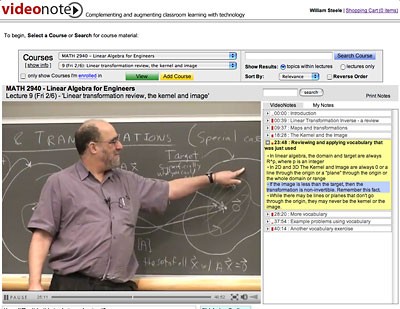Viewing taped lectures online boosts grades, raises questions
By Bill Steele
Videotaping lectures and making them available on the Web in an interactive, searchable format seems to help students get better exam scores. But the idea raises questions.
A pilot project last fall gave students in seven engineering courses free access to VideoNote, an online service offering taped lectures. In one course that was tracked closely, students scored higher on their final on questions about topics they had reviewed online.
The pilot project has been expanded to 10 courses this spring.
As a controlled test, students in ECE 2100 were divided into two groups, each given access to lectures on just one of three major topics in the course. The final exam included two questions on each topic, and students scored an average 9.5 percent higher on the questions relating to the topic they could review on VideoNote.
That's good, right?
Well, maybe, says David Gries, associate dean for engineering undergraduate programs, who is in charge of this semester's pilot project. Posting lectures online raises such questions as:
- Does it reduce attendance? Does that matter if students watch the lecture online? It might, Gries said, if the class involves a lot of discussion. Some teachers post taped lectures online but also take attendance, and there attendance doesn't fall off, he pointed out.
- Students who participate in classroom discussion would have to give permission to be videotaped. Would that inhibit discussions? Presently, VideoNote deliberately avoids including student faces or voices.
- Who pays for it? To put 10 courses online, VideoNote employs 15 part-time people for taping and editing. The provost's office may not continue funding in this economy. Is charging students a fee fair to those who can't afford it? Is this any different from requiring a textbook? Gries suggests that the service might be made available in the library for non-paying students, just as books are put on reserve.
- Will the faculty accept it? Some instructors think it's great, Gries said; others think it would cut attendance; some may be concerned about sharing their intellectual property or be self-conscious to be on the Internet, he said.
- Finally, is this just the brink of a slippery slope? Are we moving toward a Web 2.0 world where students not only don't have to attend classes but maybe don't even have to live in Ithaca?
As it turns out, "Most [students] don't watch the whole lecture, just the hard parts," said Ryan Morris, M.Eng. '08, co-founder of VideoNote, which allows students to search through lectures and play just the sections they want. A tracking feature provides feedback for teachers, he added, showing what parts of the lecture might need to be made clearer.
Compared with other courses where lectures are streamed online or available on DVD, "Ours are used 100 to 1,000 times more," said Morris, "because students can watch just the topics they need. The big thing we've done is to add this functionality that you can only do with the Internet and databases."
Morris and Paul George '04, Ph.D. '09, co-founded VideoNote as a project in an entrepreneurship class. "I was an athlete, and I needed a way to make up for missed lectures when we were on the road," Morris explained.
VideoNote started out charging fee, like the somewhat similar TakeNote. "The reason it was a fee was to get it out as quickly as possible," Morris said, noting that any other funding might have taken months. The lectures it now offers with university funding are free to anyone with a Cornell NetID, although a few courses are restricted to students enrolled in the course.
Other schools, including MIT, Stanford, Carnegie Mellon and Yale, are offering similar services, Morris noted, and some make their courses available to anyone. "Being able to do a pilot where the lectures are available to the whole world would be our ideal next step," he said.
Media Contact
Get Cornell news delivered right to your inbox.
Subscribe